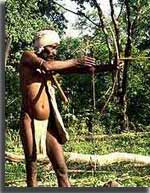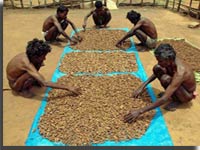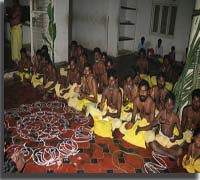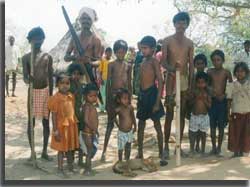Origin

They are mainly found in the districts of Mahboobnagar, Nalgonda, Prakasam, Guntur and Kurnool.
The Origin of Chenchu is connected to Lord Malikarjuna of the Srisailim temple.
Occupation

Honey is the favorite among them all. Chenchus are good hunters; they can be seen hunting for animals like deer, wild boar, rabbit, wild cock, rat and birds. They use bow and arrow for hunting. Apart from root, tubers, and fruits, Chenchus love eating fresh honey.
People
Self reliant, the Chenchus have learned various small arts, and crafts, to make their lives easier. The Chenchus prefer to do most of their things on their own.
Place /Location (then and now) |
The Chenchus are found in Tamil Nadu, Odisha and Andhra Pradesh.a |
Population |
Population of Chenchu tribes is nearly 8% of the total nation's population that is nearly 68 million people according to the census of 1991. |
Languages spoken |
Chenswar, Choncharu, Chenchwar and Chenchukoolam with telugu accent |
Religion/God |
Chenchu's worship Lord Shiva, Hanuman, Goddess of Fire for their safety and prosperity
|
Food |
The chenchus food consists of gruel made from jowar or maize, and boiled or cooked jungle tubers. |
Personality
Chenchus have short stature with long head, good eyebrows with flat nose. They have jet curly hair and their complexion vary from wheat grey to brown with broad faces. The have independent and personal freedom. Young people are free to marry whomsoever they like and can get apart whenever they like.
Staple Food
Their staple food is a gruel of Maize or Jowar and bolied or cooked junglers tubers. Chenchus love smoking and make tobacco cigarettes consumed by themselves.
Language
They speak in Chenchu language with Telugu Accent. Their language is also known as Chenchucoolam, Chenchwar, Chenswar or Choncharu.
Religion

Social Living Pattern
Penta is the name given by Chenchus to their villages. One penta consists of a few huts that are grouped together based on the kinship pattern. The close relatives live near to each other while the distant ones live further away. Chenchus homes are sparse and have a Spartan appearance. The village elder is named as 'Peddamanishi' and is generally responsible for maintaining order and harmony within the family as well as in the village as a whole. The Peddamanishi's words have the final social authority. The Chenchus are generally sub-divided into clans like the Hindus, As many as 26 gotras are found in their Chenchu society. The Chenchus do not marry within the same clan or gotra. After marriage, a woman bears the gotra of her husband.
The Chenchu marriage is known as 'Pelli'. Either the youth choose their life partners or elders arrange the marriage ceremony. The marriage ceremony takes place in a traditional way with the entire community present as the witness. Elders from 'Uttaluri' clan preside over the marriage as the priest or 'Kularaju'. The maternal uncle of the bride performs the 'sampradaan' ceremony (giving the hand of the bride) while a grand feast takes place at the conclusion of the ceremony. After marriage, the new couple set up their own house.

Though some of their children are sent to government schools, there are very few instances of educated Chenchus finding their way into mainstream modern society. The Chenchus are struggling to adapt to new patterns of life as the forest resources dwindle with time. The Chenchus have been their own masters for many generations and have not needed the services of any outsider. They are unmindful of an external society which is alien and unimportant to them. The life in the wild is one of hardship, but the Chenchus live on cheerfully unmindful of their difficulties. The NGOs in the Andhra Pradesh have made many efforts to bring the Chenchus Development Activities and make them self-reliant and educate them in which they have even succeeded to a great extent.


